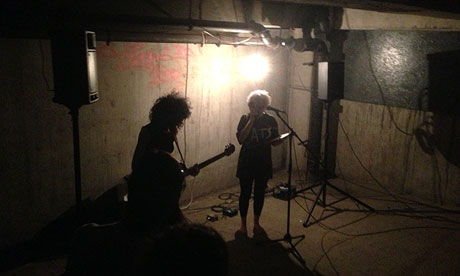
Contemporary classical music in Britain has always been pushed to the physical and cultural peripheries. In Elgar's day the focal point was the Three Choirs festival in the west of England. By the mid-century Benjamin Britten had moved the action to Suffolk. From the 1980s it had shifted again to Huddersfield.
This weekend, though, sees the start of the first ever London contemporary music festival (LCMF 2013), of which I'm a co-director and curator. It's an attempt, beginning last night, to return new classical music to the capital.
Over the course of two long weekends (25-28 July and 1-4 August), Peckham car park will resound to the drones of Tony Conrad and Charlemagne Palestine, the gnashing electric guitar epics of Glenn Branca, the stuttering beats of SND and the experimental modernism of Helmut Lachenmann. There'll be new harpsichord solos, eight-channel electronics, a trombone quartet, music for massed trumpets, opera world premieres and we'll be smashing up a piano.
There's been a lot of talk recently about contemporary music and its problems - yet it's hard to see what these are from where we're standing. All but a tiny percentage of our 5,000 free tickets went in the first four days of booking. If there is a problem with new music, it's not in the lack of an audience, or in the difficulty of the music. I think it's in the prevailing paradigm of concert programming - in its dry, miserly narratives, its identikit presentations, its uninviting spaces.
For LCMF 2013, pioneers from the worlds of sound art (Laurie Anderson), noise (Russell Haswell), American experimentalism (Frederic Rzewski), acousmatics (Bernard Parmegiani) and free improv (Steve Noble) will come together. Next to these outsiders we've put the academic giants Ligeti, Kurtág and Xenakis. Both sets are crucial to the narrative - each informs the other. Yet few established ensembles can tell this polyphonic story because bureaucracy prevents them: the financial impetus is to conserve and not experiment.
Few of these constraints are to be found in the visual arts, which have moved into the experimental vacuum vacated by contemporary music with a rapacious energy. It's no accident that galleries and university art departments played the midwife to minimalism's first experiments while its composers were forced to find refuge from the classical establishment. To capitalise on this, we've teamed up with Bold Tendencies, the arts commissioning agency behind the sculpture festival and series of public programmes at Peckham car park.
The freedom of a space such as Bold Tendencies and the curiosity of its audience is crucial. Each previous power base of new music spoke to the era it represented: cathedrals for the spiritual patriots of Three Choirs; tarted-up barns for the post-pastoralists at Aldeburgh; converted warehouses for the neomodernists at Huddersfield. So it is with LCMF 2013. It makes profound sense - artistically, acoustically and socially - to make use of such a generous space, in which one can roam and explore and not merely sit and stare.
The music at LCMF 2013 is uncompromisingly contemporary - half of the compositions will be premieres or works written since 2000 - but it is the setting and the programme that will be truly be of our time.
* The London contemporary music festival runs until 4 August.
No comments:
Post a Comment